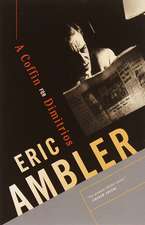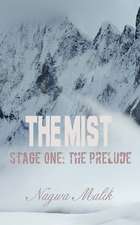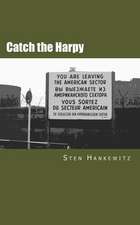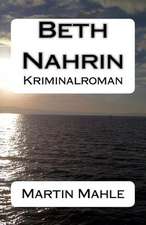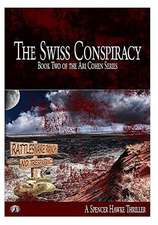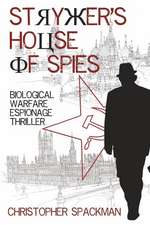The Dark Frontier
Autor Eric Ambleren Limba Engleză Hardback – mar 1990
| Toate formatele și edițiile | Preț | Express |
|---|---|---|
| Paperback (1) | 103.44 lei 3-5 săpt. | |
| VINTAGE BOOKS – 10 dec 2012 | 103.44 lei 3-5 săpt. | |
| Hardback (1) | 218.49 lei 3-5 săpt. | |
| Grand Central Publishing – mar 1990 | 218.49 lei 3-5 săpt. |
Preț: 218.49 lei
Nou
Puncte Express: 328
Preț estimativ în valută:
41.81€ • 43.77$ • 34.59£
41.81€ • 43.77$ • 34.59£
Carte disponibilă
Livrare economică 15-29 martie
Preluare comenzi: 021 569.72.76
Specificații
ISBN-13: 9780892964130
ISBN-10: 0892964138
Pagini: 304
Dimensiuni: 148 x 223 x 25 mm
Greutate: 0.5 kg
Ediția:Rev and New Int.
Editura: Grand Central Publishing
Colecția Mysterious Press
ISBN-10: 0892964138
Pagini: 304
Dimensiuni: 148 x 223 x 25 mm
Greutate: 0.5 kg
Ediția:Rev and New Int.
Editura: Grand Central Publishing
Colecția Mysterious Press
Notă biografică
Eric Ambler was born in London in 1909. Before turning to writing full-time, he worked at an engineering firm, and wrote copy for an advertising agency. His first novel was published in 1936. During the course of his career, Ambler was awarded two Gold Daggers, a Silver Dagger, and a Diamond Dagger from the Crime Writers Association of Great Britain, named a Grand Master by the Mystery Writers Association of America, and made an Officer of the Order of the British Empire by Queen Elizabeth II. In addition to his novels, Ambler wrote a number of screenplays, including A Night to Remember and The Cruel Sea, which won him an Oscar nomination. Eric Ambler died in 1998.
Extras
PART ONE
The Man Who Changed His Mind
Chapter 1
April 17th
By half-past twelve, Professor Barstow was feeling tired. He had already driven one hundred and eighty miles that day. It was with a sigh of relief that, some three-quarters of an hour later, he turned his car into the courtyard of the Royal Crown Hotel at Launceston.
He alighted, stretched himself and, with methodical care, locked the doors. Then he checked each one.
Professor Barstow did everything methodically, whether it was applying the laws of electrodynamics to a case of electronic aberration or combing his Blue Persian cat. His very appearance spelt order. His lean, sallow face, his firm lips pursed judicially and his neat dark grey suit expressed with quiet eloquence the precision of his habits. His lectures before the Royal Society were noted and respected for their dispassionate reviews of fact and their cautious admissions of theory. “Barstow,” an eminent biologist once declared, “would be a genius if he wasn’t so afraid of his own thoughts.” Which remark, following closely, as it did, upon the publication of Barstow’s critical study of the Lorentz transformations, was, to say the least of it, surprising. The truth of the matter is, perhaps, that he distrusted his imagination because it told him things he did not wish to believe.
At that moment, he was distrusting it with more than ordinary force for it was telling him something he did not want to believe; namely, that he was a sick man who should be dozing peacefully on the verandah of a spa hotel, not careering up and down precipitous hills at the wheel of his car.
He dismissed this notion firmly, went into the hotel and ordered a well-done steak. While it was being grilled he sipped at a glass of sherry.
It was, he reflected, a long time since he had had a holiday. And then, for no apparent reason, he suddenly found himself thinking of long-forgotten Cambridge days and of another spring when he had almost decided to abandon his brilliant promise as a physicist and try for “the diplomatic.”
Queer, now he came to think of it. He’d been feeling very much the same then as he did now. That was the year he’d read so hard for the math tripos. Fifteen hours a day he’d been putting in; far too much for a youngster. No wonder he’d nearly cracked up; no wonder the diplomatic had looked so attractive all of a sudden. But then he’d always had a fancy for it. His day-dreaming had always been of statesmanship behind the scenes with himself as the presiding genius, of secret treaties and rapprochements, of curtain intrigue conducted to the strains of Mozart, Gluck and Strauss, with Talleyrand and Metternich hovering in the background. Queer, too, how dreams of that sort stayed with you. One half of your brain became an inspired reasoning machine, while the other wandered over dark frontiers into strange countries where adventure, romance and sudden death lay in wait for the traveller.
Not that there would have been much adventure or sudden death in a diplomatic career—he knew that well enough now—while it had been romance, disguised as the middle-aged wife of his father’s junior partner, that had sent him back to work nursing an undeclared and hopeless passion. It had endured, he remembered now, for less than a week. He sighed.
He was still considering the pallor of his youthful follies when he took his seat in the dining-room. He ate his steak slowly. The room was empty with the exception of himself and a plump white-haired man whom he did not notice particularly until, glancing up from his plate, he was surprised to find himself the object of a fixed stare.
“A lovely day, sir,” remarked the white-haired man as their eyes met.
“Yes,” said Professor Barstow, and then, not wishing to appear brusque, “Yes, very.”
He always felt a little ill at ease when addressed by strangers and made no attempt to continue the conversation. But the white-haired man was persistent.
“Are you staying in Launceston, sir?”
Professor Barstow shook his head.
“I’m going on to Truro,” he said. “You are staying in the hotel?” he countered politely.
The white-haired man nodded absently. Then, with a sudden air of decision, he moved his chair nearer to Professor Barstow’s table and leant forward earnestly.
“Six months ago I was in China. Before that I was in South America. Before that, I was in Turkey. For six years I’ve been out of England. For six years I’ve been looking forward to the time when I could come home and settle down. Now I am home, and what do I find?”
Professor Barstow, his interest only faintly aroused, shook his head gravely. He had decided that the man must be a travelling salesman of some sort. They were notoriously talkative.
The white-haired man sipped at his coffee dramatically.
“Nothing,” he said, “absolutely nothing! I’ve been home a month now. For the first three days the sight of green fields and clipped hedges excited me. Now it bores me. All I find is a particularly venomous species of Egyptian mosquito and a landscape of petrol pumps.”
“Surely you exaggerate a little?”
“Perhaps I do,” answered the other gloomily, “but when you have been nourishing your soul on expectation, reality is apt to be disappointing.”
Dismayed by the emotional trend of the conversation, the Professor hastened to divert it.
“You have retired?”
The white-haired man looked at him for a moment before replying. The Professor was an unimpressionable man, but it occurred to him that his first estimate of his companion was certainly wrong. His plump geniality had deserted him. A pair of cold, calculating eyes stared unblinkingly from below the bushy white eyebrows. Their owner ignored the question.
“Tell me, sir,” he said thoughtfully. “I feel sure that I have seen your face before somewhere.”
The Professor felt rather than saw the cold eyes fixed upon him as he answered.
“About a year ago,” he said, “I became, for the space of two days, what the newspapers are pleased to call ‘news.’ My photograph was blazoned about the press in the most embarrassing fashion.”
The white-haired man recovered his lost geniality like magic.
“I knew it! I knew it!” He slapped his knee triumphantly. “I never forget a face, but the name sometimes eludes me. Just a minute, just a minute, don’t tell me,” he went on as the Professor opened his mouth to speak, “the name, let me see . . . the name is . . . Barstow . . . Professor Barstow.”
“You have an amazingly good memory, sir.”
“Cultivated, Professor, cultivated,” chuckled the white-haired man. He regarded the Professor with renewed interest.
“If I remember rightly,” he said, “you caused quite a commotion by announcing that atomic energy would shortly be harnessed for the uses and abuses of mankind, or words to that effect.”
“I did nothing of the kind,” protested the Professor irritably. “The statement I made before the British Association has been grossly misrepresented. All I said was that important developments in the hitherto unexplored field of applied atomic energy might prove to be mixed blessings; a mild speculation on my part upon which the most sensational constructions have been placed.”
His companion, who had drawn his chair right up to the Professor’s table, was following him with close attention.
“An amazing coincidence, amazing,” he murmured with apparent irrelevance; then, “Professor, I should be honoured if you would take a liqueur with me.”
The Professor accepted without hesitation. His experience with the newspapers still rankled and he was glad of this opportunity to explain himself to such a sympathetic audience.
For a time their conversation became general. The white-haired man’s name, the Professor discovered, was Simon Groom. He talked fluently and incessantly. His knowledge of foreign affairs was remarkable. The Professor, an assiduous reader of the Times foreign page, heard for the first time of a major crisis just past. The facts were stated with an easy familiarity that left no room for doubt. He found himself speculating on the nature of Simon Groom’s mysterious profession. The problem was soon to be solved. Groom steered the conversation once more to the subject of the Professor’s work.
“You know, Professor,” he began, cutting the end of his cigar carefully, “you know, I can’t help thinking that when you made that reference in your lecture to the fact that atomic energy in harness might prove a mixed blessing, the sensational aspect of the point was not entirely absent from your mind.”
He leant back and regarded the Professor quizzically.
The Professor was silent. The first thought that came to his mind was that this Groom was yet another of those confounded reporters trying to trap him into an admission. For the hundredth time he cursed the impulse of a year ago which had led him from the firm paths of facts to the slippery slopes of prediction.
“Mr. Groom,” he said stiffly, “I am not prepared to add anything to my original remarks. The whole thing is regrettable and most distasteful to me.”
His companion was unabashed. He smiled and withdrew his cigar from his mouth.
“Professor, I apologise. I should have stated the reason for my question. Chance has brought me into contact with the one man whose help I need. Let me explain.”
Without waiting for the Professor to speak, he continued:
“Have you ever heard of the firm of Cator & Bliss? I see that you have. Cator & Bliss, Professor, is, as you probably know, one of the largest armament manufacturing organisations in the world. We and our subsidiaries supply quite a large proportion of the world’s armaments. The French Schneider Creusot Company, our own Vickers-Armstrong group, Skoda, the Bethlehem Steel Corporation, the Du Pont Company and a number of small concerns supply the remainder.”
He paused for a moment.
“Professor,” he went on, “I should be grateful for your assurance that what I am about to tell you will be treated in the strictest confidence.”
It is doubtful whether anything could have induced the Professor at that moment to withhold the pledge required of him. He nodded gravely.
“You may rely upon me.”
Simon Groom drew at his cigar slowly before continuing.
“It is a curious commentary on human ideals and aspirations,” he said, “that never does man’s knowledge advance so rapidly as when he is creating a weapon of destruction. In England our subconscious realisation of this fact expresses itself in a mistrust of ‘new-fangled’ things. The French are more definite. They say ‘Le mieux est l’ennemi du bon.’ There are hosts of cases in point. The aeroplane, for instance: greater strides were made in its development during 1915 than during the whole of the previous ten years. The knowledge gained by commercial chemists in the search for more destructive explosives and more virulent poison gases doubled the size of the chemistry books. Why, even the science of healing advanced considerably. That is, of course, as soon as the conservation of manpower became necessary rather than merely desirable,” he added with a faint smile.
The Professor raised his eyebrows.
“The point I am trying to make, Professor,” Groom went on, “is this. War, with its demands on mankind for offensive and defensive instruments, rocks the cradle of most constructive endeavours today. The warships of yesterday produced the liners of today. The ferro-concrete fortifications of the battle area produced that wonderful new building they are putting up in North London. Bearing those facts in mind, Professor, what, I ask you, is the logical field for the development of a new and incalculable force such as that of applied atomic energy?”
“The ideals of science are constructive, not destructive,” answered the Professor stiffly. “Science in the past has been shamefully exploited. But it has learnt to protect itself.”
Simon Groom shook his head.
“No, Professor, you are wrong. While scientists are men, science cannot protect itself. The desire for supremacy which is in the hearts of all men prevents it. Even as I talk to you now, events are proving you wrong. The first atomic bomb has been made!”
Of the multitude of sensations which chased through the Professor’s mind on hearing this, the first was one of frightened suspicion. Was he sitting there talking to a madman? It seemed the only possible explanation. But, meeting the cold, level gaze of the man facing him, he began to think. Then suspicion faded and fear gripped him. Supposing it were true? Finally, he laughed.
“You have a somewhat grim sense of humour, sir.”
“I thought you would laugh,” said the other calmly; “but suspend your judgement for a moment, Professor, and let me put a question to you. Of all the laboratories in the world, from which would such a development be most likely to come? I speak, of course, in terms of facilities, not in terms of morals.”
The Professor considered for a moment.
“Well,” he said finally, “the developments which I had in mind last year, when I spoke then, could come ultimately from one or two sources. It is difficult to assign definite superiority to any one institution. There are to my knowledge laboratories possessing advanced equipment capable of carrying out experiments along those lines in London, Chicago, Schenectady, Paris and Berlin. You may take your choice.”
Simon Groom looked perplexed.
“Alas, Professor, I was hoping that you would be able to help me. This thing was done in none of those places. Have you ever heard of Zovgorod? No? Zovgorod is the capital of Ixania, and it was in that city that the work of which I am speaking has been carried out.”
The Professor chuckled.
“Mr. Groom,” he said, “you are an excellent actor, but your imagination betrays you. Why, the cost of even the pilot plants to do such work would be more than Ixania’s entire budget.”
A look of annoyance appeared for a moment on Simon Groom’s face.
“I am not joking, Professor,” he replied firmly; “to you my story may sound melodramatic and rather absurd. It is melodramatic—reality is often disconcertingly so—but it is not absurd. These are the facts.”
He paused impressively and glanced at his cigar.
“Ixania,” he said, “is a state with national aspirations. You may question the right of so insignificant a strip of unproductive country to attempt to give rein to such ambitions. It depends upon your philosophy. A disciple of Rousseau would say ‘yes’ with all the fervour of his sentimental creed. For myself, I incline more towards the Nietzschean view. Be that as it may, Ixania has for years looked towards the heights with all the gnawing envy of the weak for the strong. Now, as if in answer to her prayers, she has produced a man of genius. Her peasants are wretched, her bourgeoisie is corrupt and her government is ineffectual; yet by a freak of biology or destiny, or both, this thing has happened.”
Simon Groom looked thoughtful for a moment. His cigar seemed to fascinate him. The Professor’s air of disbelief had departed. He leant forward.
“Who is he?”
Groom puffed smoke from his mouth.
“Little is known about him,” he said; “his antecedents are obscure, probably with reason. He was educated at Zürich and at Bonn University, no one quite seems to know how. At Bonn he was brilliant. The subject he chose for his thesis involved a question which had perplexed his own professor of physics. He propounded a theory which was subsequently proved sound and then, very impertinently, demanded the chair of physics on the strength of it. From Bonn he went to Chicago and worked under Professor Thomson for about six years. About three years ago he left Chicago—there was, I believe, some sort of scandal—and returned to Zovgorod. His name is Kassen.”
The Professor uttered an exclamation.
“Kassen,” he repeated eagerly. “I’ve heard of him.”
“I thought you might have done so,” Groom assented. “He made quite an impression at the McTurk Institute.”
“But what has Kassen to do with atomic bombs? I read a paper of his once in the Proceedings of the Physical Research Society. It was, I remember, a most restrained and unsensational piece of work.”
“Quite so, but, as I have pointed out, your scientist is also a man. Kassen has been twice humiliated, at Bonn and at Chicago; and, rightly or wrongly, he nurses a grudge against the world. Knowing the sullen temperament of the average Ixanian, I am not surprised. At any rate, grudge or no grudge, the bomb has been made. The trials were carried out over three weeks ago. A representative of Cator & Bliss was present, needless to say in an—er—unofficial capacity. The trials were made in the mountains about a hundred miles north of Zovgorod. The occasion was reported in Bucharest, some hundreds of miles away as a minor seismic disturbance. Actually, a small Kassen bomb just a little larger, I am told, than a Mills grenade shifted over one thousand tons of rock.”
“But that is horrible,” gasped the Professor, and then, as reason overcame his unconscious acceptance of the statement, “—and incredible.”
“Horrible, certainly,” agreed Groom, “but incredible, no? You are no doubt aware that ordinary high explosive depends for its action on a sudden and enormous expansion in volume. Trinitrotoluol, for instance, when detonated with fulminate of mercury, expands by something like 500,000 volumes in a fraction of a second. The Kassen bomb, so far as I can gather, is an extension of the principle. Under the influence of the bomb, ordinary silicon rock or earth in its vicinity undergoes an atomic change on detonation, producing huge volumes of some inactive gas such as nitrogen, argon or helium. In other words you are using the earth as your high explosive. The Kassen bomb is merely a special kind of detonator.”
The Professor was silent. He gazed out of the window on to the garden in front of the hotel. Some daffodils were waving their heads gently to the breeze. There was a green and peaceful air about that spring afternoon. The Professor had a momentary feeling that he had just woken from a nightmare and that the fading horror of it still clung to him. As he forced himself to meet Groom’s eyes again, he found that he was trembling.
“Why do you tell me this?”
The other leant forward.
“About a fortnight ago, a representative of the Ixanian Government arrived in England stating that he wished to purchase a plant for the manufacture of confectionery. One of the firms he approached happens to be controlled by Cator & Bliss, and as the inquiry called for machinery of a non-standard type it was passed to head office. There is nothing unusual in that. What is unusual is that the specifications laid down are either the work of a man completely ignorant of confectionery manufacture or of a man who wants to adapt a confectionery plant to another use. Certain persons took an interest in the matter, and orders have been given to secure the contract at any price. This will enable us to delay, at any rate for the time being, any attempt to manufacture Kassen bombs on a large scale.”
The Professor fidgeted.
“Mr. Groom, I cannot help feeling that these confidences are a trifle—well—indiscreet. I am, after all, a perfect stranger to you and . . .”
Groom raised his hand.
“Professor,” he said, “I have learnt to put my trust in two things only—the Fates and my own intuition. They tell me that this is an important opportunity. I accept their advice gladly. It is absolutely essential that we gain possession of complete information relating to the manufacture of the Kassen bomb. My object in revealing these facts to you is not as indiscreet as you imagine. I wish to put a proposition before you. But first I should, perhaps, explain my position a little more clearly. I am the foreign representative of Cator & Bliss and a director of the company. Any proposals I may put before you can be confirmed in writing within two hours if necessary. My colleagues on the Board have complete faith in my judgment in these matters. We understand one another?”
The Professor nodded slowly.
Groom became very businesslike.
“Briefly, my proposition is this. I am, at the moment, awaiting news; news of the departure of the Ixanian representative for Zovgorod. He is expected to leave almost immediately. I shall follow. My agents in Ixania will keep track of him and find out the precise source of his instructions. My knowledge of Ixanian officialdom tells me that it will not then be difficult to get the information we require. Now, Professor, it is almost certain that attempts will be made to palm off worthless information on me. I need a technical adviser. The technical resources of Cator & Bliss are, of course, unrivalled in their sphere, but this is work of a more specialised nature. There is only one man in the world who knows more about the possibilities of applied atomic energy than you, and his name is Kassen. That balance can be redressed. Professor Barstow, I want you to come with me to Zovgorod. I offer you the post of technical adviser to Cator & Bliss.”
The Man Who Changed His Mind
Chapter 1
April 17th
By half-past twelve, Professor Barstow was feeling tired. He had already driven one hundred and eighty miles that day. It was with a sigh of relief that, some three-quarters of an hour later, he turned his car into the courtyard of the Royal Crown Hotel at Launceston.
He alighted, stretched himself and, with methodical care, locked the doors. Then he checked each one.
Professor Barstow did everything methodically, whether it was applying the laws of electrodynamics to a case of electronic aberration or combing his Blue Persian cat. His very appearance spelt order. His lean, sallow face, his firm lips pursed judicially and his neat dark grey suit expressed with quiet eloquence the precision of his habits. His lectures before the Royal Society were noted and respected for their dispassionate reviews of fact and their cautious admissions of theory. “Barstow,” an eminent biologist once declared, “would be a genius if he wasn’t so afraid of his own thoughts.” Which remark, following closely, as it did, upon the publication of Barstow’s critical study of the Lorentz transformations, was, to say the least of it, surprising. The truth of the matter is, perhaps, that he distrusted his imagination because it told him things he did not wish to believe.
At that moment, he was distrusting it with more than ordinary force for it was telling him something he did not want to believe; namely, that he was a sick man who should be dozing peacefully on the verandah of a spa hotel, not careering up and down precipitous hills at the wheel of his car.
He dismissed this notion firmly, went into the hotel and ordered a well-done steak. While it was being grilled he sipped at a glass of sherry.
It was, he reflected, a long time since he had had a holiday. And then, for no apparent reason, he suddenly found himself thinking of long-forgotten Cambridge days and of another spring when he had almost decided to abandon his brilliant promise as a physicist and try for “the diplomatic.”
Queer, now he came to think of it. He’d been feeling very much the same then as he did now. That was the year he’d read so hard for the math tripos. Fifteen hours a day he’d been putting in; far too much for a youngster. No wonder he’d nearly cracked up; no wonder the diplomatic had looked so attractive all of a sudden. But then he’d always had a fancy for it. His day-dreaming had always been of statesmanship behind the scenes with himself as the presiding genius, of secret treaties and rapprochements, of curtain intrigue conducted to the strains of Mozart, Gluck and Strauss, with Talleyrand and Metternich hovering in the background. Queer, too, how dreams of that sort stayed with you. One half of your brain became an inspired reasoning machine, while the other wandered over dark frontiers into strange countries where adventure, romance and sudden death lay in wait for the traveller.
Not that there would have been much adventure or sudden death in a diplomatic career—he knew that well enough now—while it had been romance, disguised as the middle-aged wife of his father’s junior partner, that had sent him back to work nursing an undeclared and hopeless passion. It had endured, he remembered now, for less than a week. He sighed.
He was still considering the pallor of his youthful follies when he took his seat in the dining-room. He ate his steak slowly. The room was empty with the exception of himself and a plump white-haired man whom he did not notice particularly until, glancing up from his plate, he was surprised to find himself the object of a fixed stare.
“A lovely day, sir,” remarked the white-haired man as their eyes met.
“Yes,” said Professor Barstow, and then, not wishing to appear brusque, “Yes, very.”
He always felt a little ill at ease when addressed by strangers and made no attempt to continue the conversation. But the white-haired man was persistent.
“Are you staying in Launceston, sir?”
Professor Barstow shook his head.
“I’m going on to Truro,” he said. “You are staying in the hotel?” he countered politely.
The white-haired man nodded absently. Then, with a sudden air of decision, he moved his chair nearer to Professor Barstow’s table and leant forward earnestly.
“Six months ago I was in China. Before that I was in South America. Before that, I was in Turkey. For six years I’ve been out of England. For six years I’ve been looking forward to the time when I could come home and settle down. Now I am home, and what do I find?”
Professor Barstow, his interest only faintly aroused, shook his head gravely. He had decided that the man must be a travelling salesman of some sort. They were notoriously talkative.
The white-haired man sipped at his coffee dramatically.
“Nothing,” he said, “absolutely nothing! I’ve been home a month now. For the first three days the sight of green fields and clipped hedges excited me. Now it bores me. All I find is a particularly venomous species of Egyptian mosquito and a landscape of petrol pumps.”
“Surely you exaggerate a little?”
“Perhaps I do,” answered the other gloomily, “but when you have been nourishing your soul on expectation, reality is apt to be disappointing.”
Dismayed by the emotional trend of the conversation, the Professor hastened to divert it.
“You have retired?”
The white-haired man looked at him for a moment before replying. The Professor was an unimpressionable man, but it occurred to him that his first estimate of his companion was certainly wrong. His plump geniality had deserted him. A pair of cold, calculating eyes stared unblinkingly from below the bushy white eyebrows. Their owner ignored the question.
“Tell me, sir,” he said thoughtfully. “I feel sure that I have seen your face before somewhere.”
The Professor felt rather than saw the cold eyes fixed upon him as he answered.
“About a year ago,” he said, “I became, for the space of two days, what the newspapers are pleased to call ‘news.’ My photograph was blazoned about the press in the most embarrassing fashion.”
The white-haired man recovered his lost geniality like magic.
“I knew it! I knew it!” He slapped his knee triumphantly. “I never forget a face, but the name sometimes eludes me. Just a minute, just a minute, don’t tell me,” he went on as the Professor opened his mouth to speak, “the name, let me see . . . the name is . . . Barstow . . . Professor Barstow.”
“You have an amazingly good memory, sir.”
“Cultivated, Professor, cultivated,” chuckled the white-haired man. He regarded the Professor with renewed interest.
“If I remember rightly,” he said, “you caused quite a commotion by announcing that atomic energy would shortly be harnessed for the uses and abuses of mankind, or words to that effect.”
“I did nothing of the kind,” protested the Professor irritably. “The statement I made before the British Association has been grossly misrepresented. All I said was that important developments in the hitherto unexplored field of applied atomic energy might prove to be mixed blessings; a mild speculation on my part upon which the most sensational constructions have been placed.”
His companion, who had drawn his chair right up to the Professor’s table, was following him with close attention.
“An amazing coincidence, amazing,” he murmured with apparent irrelevance; then, “Professor, I should be honoured if you would take a liqueur with me.”
The Professor accepted without hesitation. His experience with the newspapers still rankled and he was glad of this opportunity to explain himself to such a sympathetic audience.
For a time their conversation became general. The white-haired man’s name, the Professor discovered, was Simon Groom. He talked fluently and incessantly. His knowledge of foreign affairs was remarkable. The Professor, an assiduous reader of the Times foreign page, heard for the first time of a major crisis just past. The facts were stated with an easy familiarity that left no room for doubt. He found himself speculating on the nature of Simon Groom’s mysterious profession. The problem was soon to be solved. Groom steered the conversation once more to the subject of the Professor’s work.
“You know, Professor,” he began, cutting the end of his cigar carefully, “you know, I can’t help thinking that when you made that reference in your lecture to the fact that atomic energy in harness might prove a mixed blessing, the sensational aspect of the point was not entirely absent from your mind.”
He leant back and regarded the Professor quizzically.
The Professor was silent. The first thought that came to his mind was that this Groom was yet another of those confounded reporters trying to trap him into an admission. For the hundredth time he cursed the impulse of a year ago which had led him from the firm paths of facts to the slippery slopes of prediction.
“Mr. Groom,” he said stiffly, “I am not prepared to add anything to my original remarks. The whole thing is regrettable and most distasteful to me.”
His companion was unabashed. He smiled and withdrew his cigar from his mouth.
“Professor, I apologise. I should have stated the reason for my question. Chance has brought me into contact with the one man whose help I need. Let me explain.”
Without waiting for the Professor to speak, he continued:
“Have you ever heard of the firm of Cator & Bliss? I see that you have. Cator & Bliss, Professor, is, as you probably know, one of the largest armament manufacturing organisations in the world. We and our subsidiaries supply quite a large proportion of the world’s armaments. The French Schneider Creusot Company, our own Vickers-Armstrong group, Skoda, the Bethlehem Steel Corporation, the Du Pont Company and a number of small concerns supply the remainder.”
He paused for a moment.
“Professor,” he went on, “I should be grateful for your assurance that what I am about to tell you will be treated in the strictest confidence.”
It is doubtful whether anything could have induced the Professor at that moment to withhold the pledge required of him. He nodded gravely.
“You may rely upon me.”
Simon Groom drew at his cigar slowly before continuing.
“It is a curious commentary on human ideals and aspirations,” he said, “that never does man’s knowledge advance so rapidly as when he is creating a weapon of destruction. In England our subconscious realisation of this fact expresses itself in a mistrust of ‘new-fangled’ things. The French are more definite. They say ‘Le mieux est l’ennemi du bon.’ There are hosts of cases in point. The aeroplane, for instance: greater strides were made in its development during 1915 than during the whole of the previous ten years. The knowledge gained by commercial chemists in the search for more destructive explosives and more virulent poison gases doubled the size of the chemistry books. Why, even the science of healing advanced considerably. That is, of course, as soon as the conservation of manpower became necessary rather than merely desirable,” he added with a faint smile.
The Professor raised his eyebrows.
“The point I am trying to make, Professor,” Groom went on, “is this. War, with its demands on mankind for offensive and defensive instruments, rocks the cradle of most constructive endeavours today. The warships of yesterday produced the liners of today. The ferro-concrete fortifications of the battle area produced that wonderful new building they are putting up in North London. Bearing those facts in mind, Professor, what, I ask you, is the logical field for the development of a new and incalculable force such as that of applied atomic energy?”
“The ideals of science are constructive, not destructive,” answered the Professor stiffly. “Science in the past has been shamefully exploited. But it has learnt to protect itself.”
Simon Groom shook his head.
“No, Professor, you are wrong. While scientists are men, science cannot protect itself. The desire for supremacy which is in the hearts of all men prevents it. Even as I talk to you now, events are proving you wrong. The first atomic bomb has been made!”
Of the multitude of sensations which chased through the Professor’s mind on hearing this, the first was one of frightened suspicion. Was he sitting there talking to a madman? It seemed the only possible explanation. But, meeting the cold, level gaze of the man facing him, he began to think. Then suspicion faded and fear gripped him. Supposing it were true? Finally, he laughed.
“You have a somewhat grim sense of humour, sir.”
“I thought you would laugh,” said the other calmly; “but suspend your judgement for a moment, Professor, and let me put a question to you. Of all the laboratories in the world, from which would such a development be most likely to come? I speak, of course, in terms of facilities, not in terms of morals.”
The Professor considered for a moment.
“Well,” he said finally, “the developments which I had in mind last year, when I spoke then, could come ultimately from one or two sources. It is difficult to assign definite superiority to any one institution. There are to my knowledge laboratories possessing advanced equipment capable of carrying out experiments along those lines in London, Chicago, Schenectady, Paris and Berlin. You may take your choice.”
Simon Groom looked perplexed.
“Alas, Professor, I was hoping that you would be able to help me. This thing was done in none of those places. Have you ever heard of Zovgorod? No? Zovgorod is the capital of Ixania, and it was in that city that the work of which I am speaking has been carried out.”
The Professor chuckled.
“Mr. Groom,” he said, “you are an excellent actor, but your imagination betrays you. Why, the cost of even the pilot plants to do such work would be more than Ixania’s entire budget.”
A look of annoyance appeared for a moment on Simon Groom’s face.
“I am not joking, Professor,” he replied firmly; “to you my story may sound melodramatic and rather absurd. It is melodramatic—reality is often disconcertingly so—but it is not absurd. These are the facts.”
He paused impressively and glanced at his cigar.
“Ixania,” he said, “is a state with national aspirations. You may question the right of so insignificant a strip of unproductive country to attempt to give rein to such ambitions. It depends upon your philosophy. A disciple of Rousseau would say ‘yes’ with all the fervour of his sentimental creed. For myself, I incline more towards the Nietzschean view. Be that as it may, Ixania has for years looked towards the heights with all the gnawing envy of the weak for the strong. Now, as if in answer to her prayers, she has produced a man of genius. Her peasants are wretched, her bourgeoisie is corrupt and her government is ineffectual; yet by a freak of biology or destiny, or both, this thing has happened.”
Simon Groom looked thoughtful for a moment. His cigar seemed to fascinate him. The Professor’s air of disbelief had departed. He leant forward.
“Who is he?”
Groom puffed smoke from his mouth.
“Little is known about him,” he said; “his antecedents are obscure, probably with reason. He was educated at Zürich and at Bonn University, no one quite seems to know how. At Bonn he was brilliant. The subject he chose for his thesis involved a question which had perplexed his own professor of physics. He propounded a theory which was subsequently proved sound and then, very impertinently, demanded the chair of physics on the strength of it. From Bonn he went to Chicago and worked under Professor Thomson for about six years. About three years ago he left Chicago—there was, I believe, some sort of scandal—and returned to Zovgorod. His name is Kassen.”
The Professor uttered an exclamation.
“Kassen,” he repeated eagerly. “I’ve heard of him.”
“I thought you might have done so,” Groom assented. “He made quite an impression at the McTurk Institute.”
“But what has Kassen to do with atomic bombs? I read a paper of his once in the Proceedings of the Physical Research Society. It was, I remember, a most restrained and unsensational piece of work.”
“Quite so, but, as I have pointed out, your scientist is also a man. Kassen has been twice humiliated, at Bonn and at Chicago; and, rightly or wrongly, he nurses a grudge against the world. Knowing the sullen temperament of the average Ixanian, I am not surprised. At any rate, grudge or no grudge, the bomb has been made. The trials were carried out over three weeks ago. A representative of Cator & Bliss was present, needless to say in an—er—unofficial capacity. The trials were made in the mountains about a hundred miles north of Zovgorod. The occasion was reported in Bucharest, some hundreds of miles away as a minor seismic disturbance. Actually, a small Kassen bomb just a little larger, I am told, than a Mills grenade shifted over one thousand tons of rock.”
“But that is horrible,” gasped the Professor, and then, as reason overcame his unconscious acceptance of the statement, “—and incredible.”
“Horrible, certainly,” agreed Groom, “but incredible, no? You are no doubt aware that ordinary high explosive depends for its action on a sudden and enormous expansion in volume. Trinitrotoluol, for instance, when detonated with fulminate of mercury, expands by something like 500,000 volumes in a fraction of a second. The Kassen bomb, so far as I can gather, is an extension of the principle. Under the influence of the bomb, ordinary silicon rock or earth in its vicinity undergoes an atomic change on detonation, producing huge volumes of some inactive gas such as nitrogen, argon or helium. In other words you are using the earth as your high explosive. The Kassen bomb is merely a special kind of detonator.”
The Professor was silent. He gazed out of the window on to the garden in front of the hotel. Some daffodils were waving their heads gently to the breeze. There was a green and peaceful air about that spring afternoon. The Professor had a momentary feeling that he had just woken from a nightmare and that the fading horror of it still clung to him. As he forced himself to meet Groom’s eyes again, he found that he was trembling.
“Why do you tell me this?”
The other leant forward.
“About a fortnight ago, a representative of the Ixanian Government arrived in England stating that he wished to purchase a plant for the manufacture of confectionery. One of the firms he approached happens to be controlled by Cator & Bliss, and as the inquiry called for machinery of a non-standard type it was passed to head office. There is nothing unusual in that. What is unusual is that the specifications laid down are either the work of a man completely ignorant of confectionery manufacture or of a man who wants to adapt a confectionery plant to another use. Certain persons took an interest in the matter, and orders have been given to secure the contract at any price. This will enable us to delay, at any rate for the time being, any attempt to manufacture Kassen bombs on a large scale.”
The Professor fidgeted.
“Mr. Groom, I cannot help feeling that these confidences are a trifle—well—indiscreet. I am, after all, a perfect stranger to you and . . .”
Groom raised his hand.
“Professor,” he said, “I have learnt to put my trust in two things only—the Fates and my own intuition. They tell me that this is an important opportunity. I accept their advice gladly. It is absolutely essential that we gain possession of complete information relating to the manufacture of the Kassen bomb. My object in revealing these facts to you is not as indiscreet as you imagine. I wish to put a proposition before you. But first I should, perhaps, explain my position a little more clearly. I am the foreign representative of Cator & Bliss and a director of the company. Any proposals I may put before you can be confirmed in writing within two hours if necessary. My colleagues on the Board have complete faith in my judgment in these matters. We understand one another?”
The Professor nodded slowly.
Groom became very businesslike.
“Briefly, my proposition is this. I am, at the moment, awaiting news; news of the departure of the Ixanian representative for Zovgorod. He is expected to leave almost immediately. I shall follow. My agents in Ixania will keep track of him and find out the precise source of his instructions. My knowledge of Ixanian officialdom tells me that it will not then be difficult to get the information we require. Now, Professor, it is almost certain that attempts will be made to palm off worthless information on me. I need a technical adviser. The technical resources of Cator & Bliss are, of course, unrivalled in their sphere, but this is work of a more specialised nature. There is only one man in the world who knows more about the possibilities of applied atomic energy than you, and his name is Kassen. That balance can be redressed. Professor Barstow, I want you to come with me to Zovgorod. I offer you the post of technical adviser to Cator & Bliss.”
Recenzii
“A must for the mystery faithful.” —Los Angeles Times
“[Ambler] was wonderfully gifted. . . . It is a pleasure to see where the master began.” —Chicago Tribune
“The thinking man’s thriller writer.” —The Washington Post
“Ambler is, quite simply, the best.” —The New Yorker
“Busy and engaging. . . . [The Dark Frontier] is a romp, although with hints of the harder line that Ambler was to take in the later novels.” —Los Angeles Times
“The foremost thriller writer of our time.” —Time
“Mr. Ambler is a phenomenon!” —Alfred Hitchcock
“One of the masters of the thriller. . . . Ambler took the spy thriller out of the gentility of the drawing room and into the back streets . . . where it all really happened.” —Associated Press
“Ambler is incapable of writing a dull paragraph.”— Sunday Times (London)
“[Ambler] was wonderfully gifted. . . . It is a pleasure to see where the master began.” —Chicago Tribune
“The thinking man’s thriller writer.” —The Washington Post
“Ambler is, quite simply, the best.” —The New Yorker
“Busy and engaging. . . . [The Dark Frontier] is a romp, although with hints of the harder line that Ambler was to take in the later novels.” —Los Angeles Times
“The foremost thriller writer of our time.” —Time
“Mr. Ambler is a phenomenon!” —Alfred Hitchcock
“One of the masters of the thriller. . . . Ambler took the spy thriller out of the gentility of the drawing room and into the back streets . . . where it all really happened.” —Associated Press
“Ambler is incapable of writing a dull paragraph.”— Sunday Times (London)


